The U.S. EPA last week called for public comment on ways to develop safer fracking chemicals. Fracking -- or hydraulic fracturing -- shoots sand, water, and assorted chemicals deep underground. But the industry has no responsibility to tell property owners what’s in the chemical cocktail or to inform them about spills or pipeline breaks.
 Out of sight but not out of mind Out of sight but not out of mind
That worries Mick Luber, a lot. “I run Bluebird Organic Farm. We’re in eastern Ohio about 7 miles from Cadiz, in Harrison County" -- which is in the heart of Ohio's fracking boom.
He grows vegetables and raises chickens for eggs.
“They’re a Hubbard Comet. They’re a cross between a Rhode Island Red and a Bard Rock. The roosters are white, as you can see, and the hens are brown. They lay a brown egg.”
Luber called the Ohio EPA two years ago when he saw a chalky white substance trickling out of a hill above his farm where a natural gas well was being drilled. He worried he’d lose his organic certification if it were to contaminate the stream running through his fields of onions, beans, carrots, tomatoes, peppers and eggplant. “They came out and investigated. They said that they’ve taken care of the problem.” carrots, tomatoes, peppers and eggplant. “They came out and investigated. They said that they’ve taken care of the problem.”
New worries in farmland
But now he fears other potential impacts. We climb into his truck for a bumpy ride. The roads are ravaged, and he tells neighbors who signed leases with the oil companies they have only themselves to blame.
“My neighbors have taken the money. So they’re all in favor of it, until they see the road conditions now that they’ve been running big trucks across the roads,destroying the roads.”
Economic benefits along with the risks
To the contrary, says Tom Stewart, executive vice president of the Ohio Oil and Gas Association. He says the industry’s investment in infrastructure is a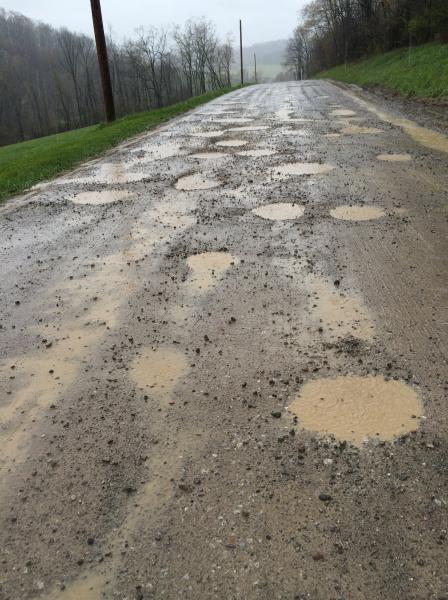 boon to local governments. boon to local governments.
“They are overjoyed on the money that’s been invested by producers to upgrade roads that were completely trashed out in the first place. In fact, I heard a county engineer tell me once that they had a road going to a well site that was essentially a gravel road and they turned it into a highway.”
Impact up in the air
But when he looks up from the potholes there’s another image farmer Luber can’t get out of his head.
“You can see right up through those trees the pad where they currently have fracked and (are) getting ready to flare.”
When they do, Luber worries about air quality for his crops below and the health of people who consume them.
“All the particulate matter from that well are going to come down on my land, and I’m selling them a 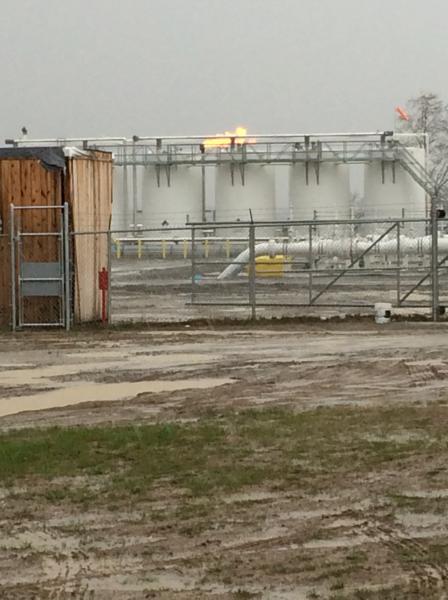 product to make them healthy.” product to make them healthy.”
But since he sees no current, direct impact, he doesn’t share his fears with customers.
Shoppers unaware
“When you go to a farmers’ market it’s sort of a sunny place where you get away from things and you get fresh vegetables. Talking about what’s terrible happening to you, it gets old for people to have to confront that stuff on a regular basis.”
“Could something happen?” asks the Ohio Oil and Gas Association’s Stewart. “Do airplanes fall out of the skies? Do buildings fall down? Do accidents happen? Yeah, accidents happen.”
But he says if and when they do, farmers can trust what he calls their industry "partners."
Nothing to fear from “partners” says the industry
“We care about our relationships with those people because we need them in order to do business. If we have a problem on property are we going to look at our partner and say, ‘Screw you’? No. We’re going to work with them and say, ‘We’ve got an issue here. We’ve got to clean it up.’
"Do we need a law in order to do that? I don’t think so.”
But the Ohio Environmental Council does. It’s pushing the SAFER gas act to mandate that the industry immediately alert not only government officials, but also farmers when accidents occur. Trent Daugherty directs the OEC’s legal affairs.
“People that lease their land aren’t notified when something potentially harmful occurs on their land until there’s a final report by the (Ohio) Department of Natural Resources. And you don’t want a farmer or a farmer’s family, children in their back 40, playing around, or working in an area that’s potentially contaminated or potentially unsafe.”
Fears from afar
One western Stark County farmer doubts a disclosure mandate would pass. “Perhaps once we get a new legislature," says Alex Dragovich. "Most of them have accepted oil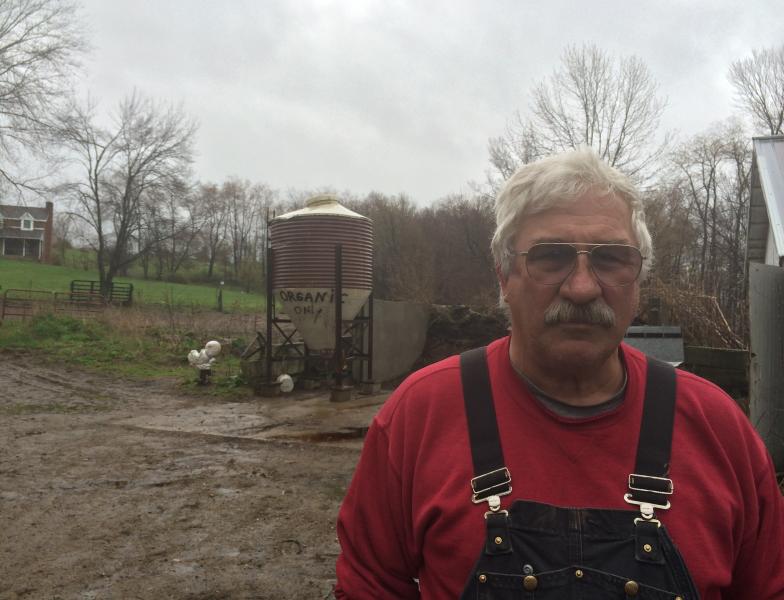 money, and they have embraced these people.” money, and they have embraced these people.”
Dragovich plows his fields the old fashioned way at his Mud Run Farm. “This is Tom. He’s a 5-year old Percheron. Most of the horses we use are Percherons.”
Mud Run is well west of the state’s fracking boom, but he sees it coming. He’s turned down several leasing agents who want access to his land.
“My biggest concern has always been water. The only water we have on this farm is the water we pull out of the aquifer down here. If at any given time they would start to frack, there is in my opinion a good chance of damaging any water we have.” He’s afraid of losing his livelihood. “We raised our family here. This has been a good place for us.”
Water is gold
Since most of Dragovich’s neighbors have signed leases with oil and gas companies, he could lose control over his property anyway under the laws of eminent domain. But he still won’t sign.
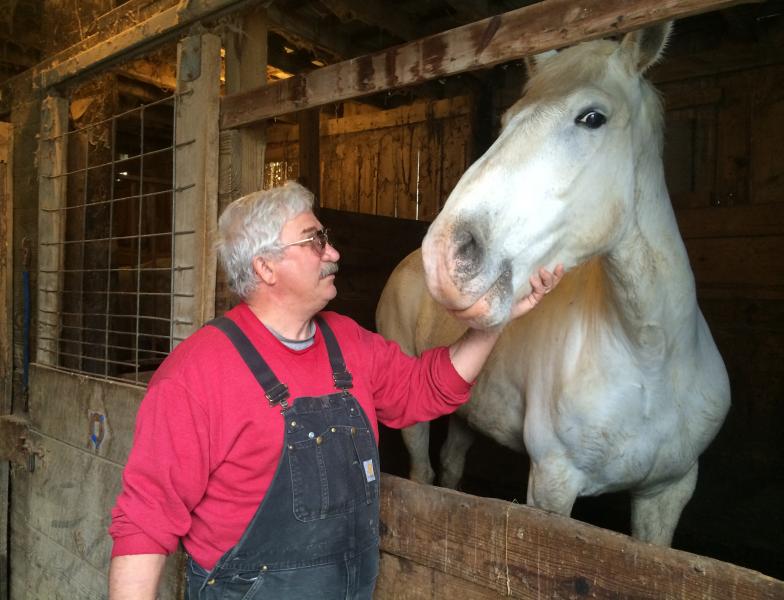 "First off I don’t like to be bullied, and the second reason is I worked 40 years for this place. And those are my mineral rights.” "First off I don’t like to be bullied, and the second reason is I worked 40 years for this place. And those are my mineral rights.”
He understands the value of natural gas and the economic boon it is for many, but it is water, he says, that’s like gold to a farmer.
“One lease man said ‘Mr. Dragovich, we are 99 percent sure that you will never have any problems with your water.’ And I said ‘Well, why don’t you put that on your lease here, that you’ll take care of any damages that we have?’ and he says, ‘No, we can’t do that.’ ”
But farmer Dragovich, according to industry spokesman Stewart, worries in vain.
Fears are unfounded says the industry
“What water that’s flowed back from those wells is disposed here in the state of Ohio according to the landmark federal law known as the Safe Drinking Water Act. We do not put it back in streams. We do not put it back in pits. That’s been against the law since 1984. We construct our wells in such a way that we don’t impact drinking water reservoirs or potential reservoirs underground and on the ground.”
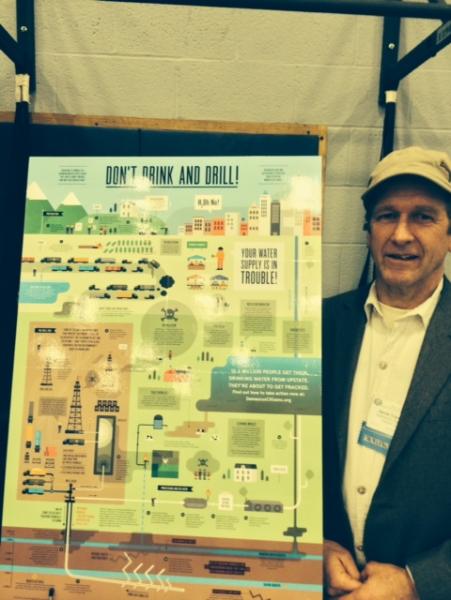 Just 10 days ago voters in Mahoning County turned down for the third time a proposed moratorium on fracking, despite a recent Ohio Department of Natural Resources report linking the drilling process to a rash of earthquakes. The Oil and Gas Association’s Tom Stewart says the majority was right. Just 10 days ago voters in Mahoning County turned down for the third time a proposed moratorium on fracking, despite a recent Ohio Department of Natural Resources report linking the drilling process to a rash of earthquakes. The Oil and Gas Association’s Tom Stewart says the majority was right.
“Is there impact from economic activity? There is. The largest impact I see on farmers is the $5,000 an acre that they’re getting if they sign a lease that says, ‘Come onto my property and drill a well.’”
$19 billion invested
The state has seen almost $19 billion in investments in more than 100 shale-related projects, about a fifth of those in the Mahoning Valley.
Earthquakes in 2012 in Youngstown were linked, according to ODNR, not to hydraulic fracturing, but to injection wells -- the dumping ground for oil and gas waste from West Virginia and Pennsylvania as well as Ohio.
That’s what has grass-fed beef farmer Mardi Townsend all shook up in seismically-active Ashtabula County.
“I definitely fear it. There are four injection wells being heavily used about a mile and a half from me upstream. And two more permits have been applied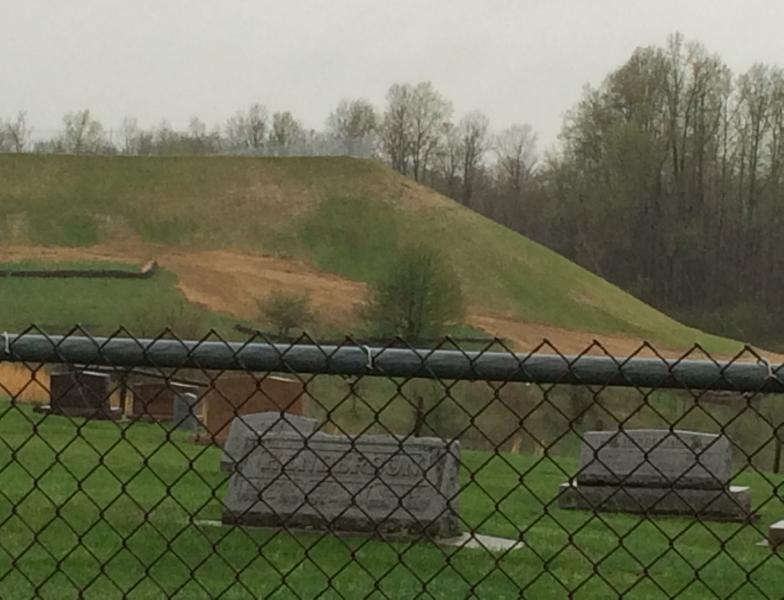 for drilling two more wells on that same site. And I know that the injection well-casings will fail eventually because all well casings fail. I hope it’s not in my lifetime, but they will fail and they will contaminate the ground water and it will be very bad for people and animals.” for drilling two more wells on that same site. And I know that the injection well-casings will fail eventually because all well casings fail. I hope it’s not in my lifetime, but they will fail and they will contaminate the ground water and it will be very bad for people and animals.”
But these are groundless fears, according to the industry spokesman, because casings are protected by steel pipes called “strings.”
The case for casings
“That’s not going to happen. You’re putting in casing strings, sometimes up to three casing strings that are all cemented underground through the groundwater reservoir.”
Farmers, he says, actually have more to gain than lose from fracking. “The agriculture community are very heavy users of energy. They like the fact that energy prices have moderated where we have Marcellus and Utica production. And we have very high BTU gas being generated (with which) they make all kinds of great things that farmers need, like fertilizer at affordable prices.”
Quakes are commonplace
As for the quakes, he says, no big shakes. Happens every day. “Cal Tech recently said that 8,000 quakes per day fall in the range of 1-point-0 to 1-point-9, similar to what the recent incident was in Mahoning County. People within a mile felt a slight shaking. Do we want that to happen? No. Are there ways to mitigate it? Yes. And we’re working with regulatory agencies now to try to figure that out.”
How can you stop an earthquake? He says it’s simple: “Don’t drill into known faults.”
After the boom
Meanwhile, back at Bluebird Farm, Mick Luber just hopes his groundwater’s safe.
“But what are you going to do even if you have a spill? You can’t go 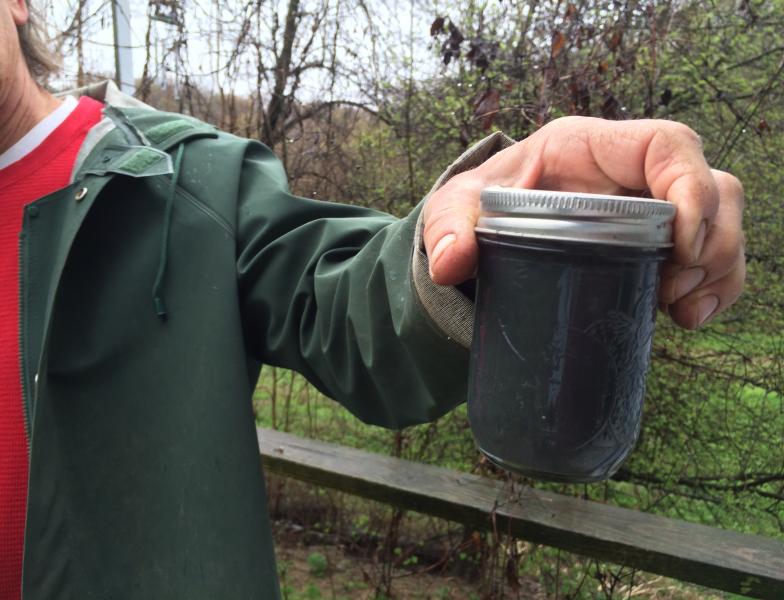 back and make your water clean.” back and make your water clean.”
And Mud Run Farm’s Alex Dragovich hopes Ohio agriculture can survive the natural gas boom.
“This thing’s only going to last 20 maybe 30 years. And then we’re going to live with that the rest of our lives.”
And that’s this week’s Quick Bite. Next week we find out how the honey bees that pollinate so much of our food made it through the harsh winter. |